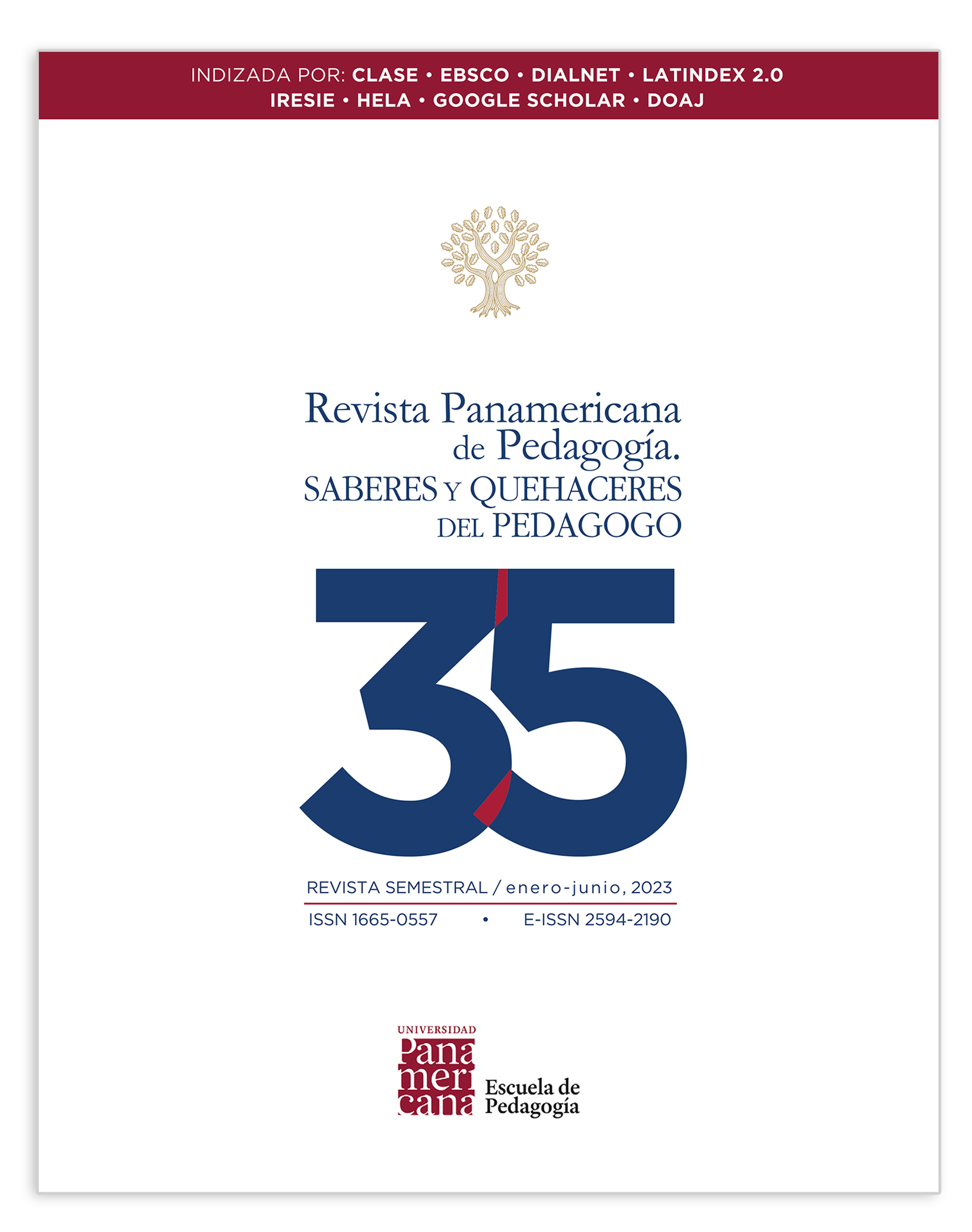PERCEPCIONES DOCENTES SOBRE LA PANDEMIA DEL COVID-19 COMO CONTENIDO CURRICULAR EMERGENTE EN EL CONTEXTO DE APRENDIZAJE
Publicado 31-12-2022
Palabras clave
- contenido curricular,
- contexto de aprendizaje,
- docente,
- pandemia
Derechos de autor 2022 Revista Panamericana de Pedagogía

Esta obra está bajo una licencia internacional Creative Commons Atribución-NoComercial-CompartirIgual 4.0.
Cómo citar
Resumen
La pandemia del COVID-19 trajo repercusiones en distintos niveles y generó nuevos aprendizajes que no formaban parte del currículo escolar, pero se reconocen como necesarios para ayudar a los estudiantes a comprender la situación que viven y gestionar su agencia. Precisamente, debido a la necesidad de informar y educar sobre la prevención y el cuidado, se incorpora en el currículo escolar la pandemia del COVID-19 como un contenido emergente, vinculado con una problemática que sobreviene sin más, gracias a la cual es necesario revisar y cuestionar de forma crítica (Anguita et al., 2010; Dego y Ferraz, 2008). Este estudio cualitativo busca explorar las percepciones docentes sobre la incorporación de la pandemia del COVID-19, como contenido emergente en la implementación del currículo y los aportes de dicho contenido en los estudiantes y sus familias, durante la educación remota (abril 2020 y julio 2021). Se entrevistaron a dieciocho docentes de dos escuelas del Cercado de Lima. La pandemia representó un contenido emergente y estructurador, alrededor del cual se vincularon diversos contenidos conceptuales, prácticas, hábitos y actitudes, incorporados a través de la programación de experiencias significativas, la integración de áreas curriculares, en actividades permanentes y de tutoría. Los docentes perciben un currículo flexible que les permitió adaptar la propuesta oficial a la realidad y necesidades de sus estudiantes. La pandemia aportó aprendizajes centrados en la práctica de nuevos hábitos de cuidado personal y de salud, así como la importancia de valores como la solidaridad y resiliencia, entre otros.
Referencias
- Anguita, M., Hernández, F., y Ventura, M. (2010). Los proyectos, tejido de relaciones y saberes. Cuadernos de Pedagogía, 400, pp. 77-80. http://hdl.handle.net/11162/37057
- Bardin, L. (2011). Análise de conteúdo. Edições 70.
- Beech, J., Artopoulos, A., Capelletti,G., Furman, M., y Minvielle, L. (2017). Saberes emergentes. https://www.educ.ar/recursos/132263/saberes-emergentes
- Cárdenas, C., Guerrero, S., y Johnson, D. (2021). Construir currículum desde abajo: avanzando en la documentación de una propuesta curricular en el contexto del COVID-19. Revista Educación, 30(58), pp. 34-58. https://doi.org/10.18800/educacion. 202101.002
- Casanova, M.A. (2009). Diseño curricular e innovación educativa. Editorial La Muralla.
- Casanova, M.A. (2012). El diseño curricular como factor de calidad educativa. REICE. Revista Iberoamericana sobre Calidad, Eficacia y Cambio en Educación, 10(4), pp. 6-20. http://www.rinace.net/reice/numeros/arts/vol10num4/art1.pdf
- CEPAL-UNESCO (2020). La educación en tiempos de pandemia de COVID-19. https://www.cepal.org/es/publicaciones/45904-la-educacion-tiempos-la-pandemia-covid-19
- Ciscar, C., y Uría, M.E. (1993). Los contenidos en el proceso de enseñanza-aprendizaje. Naullibres.
- Dammert, M. (2018). Precariedad urbana, desalojos y vivienda en el centro histórico de Lima. Revista INVI, 33(94), pp. 51-76. http://dx.doi.org/10.4067/S0718-83582018000300051
- Dego, A., y Ferraz, M.T. (2008). El tratamiento de los temas emergentes. Quehacer Educativo, 91, 83-86. https://www.fumtep.edu.uy/editorial/item/download/87_72dd29870a1872d1dcc48353896142e3
- Dirección Regional de Lima Metropolitana (2017). Currículo por la emergencia para instituciones educativas de Educación Básica de Lima Metropolitana 2017. MINEDU. https://www.drelm.gob.pe/drelm/wp-content/uploads/2017/04/CURRICULOEMERGENCIA.pdf
- Kvale, S. (2011). Las entrevistas en la investigación cualitativa. Morata.
- González, E.J. (2012). La ambientalización del currículum escolar: breve recuento de una azarosa historia. Profesorado. Revista de Currículum y Formación de Profesorado, 16(2), pp. 15-24. https://www.redalyc.org/articulo.oa?id=56724395002
- Guzmán, M.A. (2001). Interacciones emergentes. Una aproximación teórica para comprender el significado innovador de la producción curricular intra-aula. Pensamiento Educativo. Revista de Investigación Educacional Latinoamericana, 29(2), pp. 319-340. http://www.redae.uc.cl/index.php/pel/article/view/26195
- Instituto Nacional de Estadística e Informática-INEI (2022). Estado de la Niñez y Adolescencia (Informe técnico), n. 01, marzo 2022.
- Jauregui, S. (2018). La transversalidad curricular: algunas consideraciones teóricas para su implementación. Revista Boletín Redipe, 7(11), pp. 65-81. https://revista.redipe.org/index.php/1/article/view/627
- Magendzo, A. (2021). Un currículum controversial-problematizador: un desafío para la educación de América Latina. Revista Iberoamericana de Educación Superior, 12(34), pp. 215-220. https://doi.org/10.22201/iisue.20072872e.2021.34.988
- Ministerio de Educación (2018). Encuesta Nacional a Docentes. http://www.minedu.gob.pe/politicas/docencia/pdf/endo-2018-resultados-regionales.pdf
- Ministerio de Educación (2020). Resolución Viceministerial, n. 00093-2020-Minedu Orientaciones pedagógicas para el servicio educativo de Educación Básica durante el año 2020 en el marco de la emergencia sanitaria por el coronavirus COVID-19. https://busquedas.elperuano.pe/download/url/aprueban-el-documento-normativo-denominado-orientaciones-pe-resolucion-vice-ministerial-n-00093-2020-minedu-1865785-1
- Opertti, R. (2020). Un currículo en emergencia para la región SICA: contenido y metodología. https://ceccsica.info/sites/default/files/inlinefiles/Un%20Curr%C3%ADculo%20en%20Emergencia%20para%20la%20regi%C3%B3n%20SICA.pdf
- Rojas, E. (2005). Perfiles educativos: análisis preliminar de temas emergentes. Perfiles educativos, 27(109-110), pp. 184-189. http://www.scielo.org.mx/scielo.php?script=sci_arttext&pid=S0185-26982005000200010&lng
- Stake, R. (2007). Investigación con estudio de casos (4ª. ed.). Morata.
- Vallés, M. (2007). Técnicas cualitativas de investigación social: reflexión metodológica y práctica profesional. Síntesis.
- Zabala, A. (2000). El aprendizaje de los contenidos según su tipología. La práctica educativa. Cómo enseñar, pp. 37-46. Graó.






